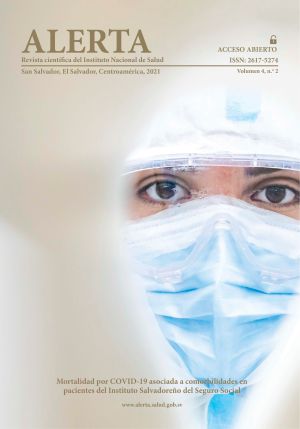Mortality due to COVID-19 associated with comorbidities in patients of the Salvadoran Social Security Institute
DOI:
https://doi.org/10.5377/alerta.v4i2.10366Keywords:
COVID-19, mortality, comorbidity, survivalAbstract
Introduction. The respiratory infection by coronavirus has generated a large number of deaths since its beginning in China in December 2019. Because it is an unknown disease, studies are needed to improve the approach specially to people at risk.
Objective. Investigate factors associated with higher fatalities from COVID-19 in patients from the Salvadoran Social Security Institute.
Methodology. Cross-sectional analysis of 2,670 infected (or possible) patients. The variables were analyzed with the Kaplan Meier method and the Cox proportional risk model.
Results. Cohort verified between April and August 2020, non-survivors included older people and with underlying diseases such as hypertension, diabetes, kidney failure and cancer. Hypertension had a hazard ratio and 95 % confidence interval of 2,58/2,3-2,9 and diabetes, 2,56/2,2–2,9.
Age under 60 (0,34/0,30–0,39) and absence of disease (0,31/0,27-0,35) are associated with the opposite. Overall survival was 93,6%/92,5–94,5% at day 1, and 50,4% / 48,1–52,6% at day 15th. Heart disease had the lowest 5-day survival (71,4% to 41,2%) and cancer at 15 days (51,1% to 3,9%).
Conclusion. People under 60 without comorbidities have a lower risk of death compared to those with comorbidities such as diabetes, hypertension and cancer, which presented a 3 times higher risk of in-hospital death from COVID-19 and lower survival at 15 days.
Downloads
1344
Downloads
Published
How to Cite
Issue
Section
License
Privacy statement:
Alerta articles are published under license Creative Commons 4.0 CC BY: https://creativecommons.org/licenses/by/4.0/
Authorship rights
Revista Alerta gives the authors exclusive control of their work and the right to be acknowledged and cited.





